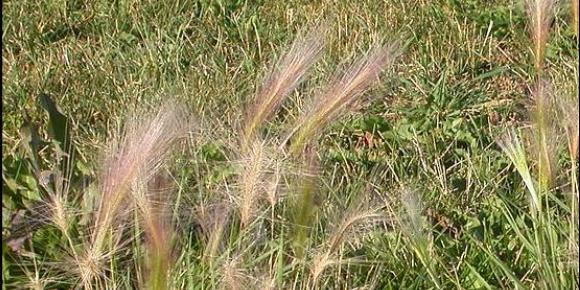Beware of Foxtail!

- posted: Jun. 27, 2018
If you have taken a walk around your neighborhood or to the dog park, chances are you have seen foxtail. Many people aren't aware of the potential pitfalls of this common weed, so at Wascana Animal Hospital our veterinary team wants to do our best to spread the word to our clients and other pet owners about how nasty this plant can be!
In the young growing phase, this grass-like plant has a soft bushy appearance that appears relatively harmless. As the plant matures, the soft bristles start to dry up exposing prickly points and sharp awns. Many of our canine patients are out running and playing in the grass and our feline family members often like to run outside and eat whatever grass they can find too. If you are outside in an area where you can see a lot of foxtail, we recommend choosing a new place to walk and play!
Every year our veterinarians see cases of illness in our dog and cat family members that are due to foxtail. The prickly awns can become lodged in the back of the throat and the tonsils in pets. These patients will often suffer from repeated uncomfortable episodes of retching, gagging, coughing and sometimes vomiting. The little awns are sharp and can also penetrate the skin. Sometimes awns will cause a painful localized infection where it has lodged in a paw, other times these little barbs can actually migrate under the skin and through other tissues causing chronic pain, infection and damage to other organs. Dr. Ulmer even had a case once where a bladder stone had developed in a dog secondary to a foxtail awn that had penetrated the abdominal and bladder walls and caused chronic inflammation in the bladder!
As always, if you have any concerns or questions about potential foxtail exposure with your pet, schedule an examination with one of our experienced Veterinarians!

- posted: Jun. 27, 2018
If you have taken a walk around your neighborhood or to the dog park, chances are you have seen foxtail. Many people aren't aware of the potential pitfalls of this common weed, so at Wascana Animal Hospital our veterinary team wants to do our best to spread the word to our clients and other pet owners about how nasty this plant can be!
In the young growing phase, this grass-like plant has a soft bushy appearance that appears relatively harmless. As the plant matures, the soft bristles start to dry up exposing prickly points and sharp awns. Many of our canine patients are out running and playing in the grass and our feline family members often like to run outside and eat whatever grass they can find too. If you are outside in an area where you can see a lot of foxtail, we recommend choosing a new place to walk and play!
Every year our veterinarians see cases of illness in our dog and cat family members that are due to foxtail. The prickly awns can become lodged in the back of the throat and the tonsils in pets. These patients will often suffer from repeated uncomfortable episodes of retching, gagging, coughing and sometimes vomiting. The little awns are sharp and can also penetrate the skin. Sometimes awns will cause a painful localized infection where it has lodged in a paw, other times these little barbs can actually migrate under the skin and through other tissues causing chronic pain, infection and damage to other organs. Dr. Ulmer even had a case once where a bladder stone had developed in a dog secondary to a foxtail awn that had penetrated the abdominal and bladder walls and caused chronic inflammation in the bladder!
As always, if you have any concerns or questions about potential foxtail exposure with your pet, schedule an examination with one of our experienced Veterinarians!
Visit our Office
3259 Eastgate Drive
Regina, Saskatchewan S4Z1A4
